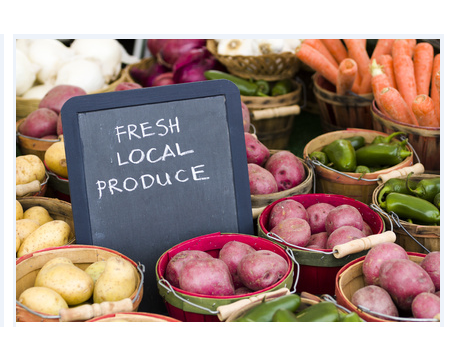Ontario Farmers Markets Guide – Best Tips How to Buy local Food & Produce

Summer is almost over and the harvest is in full swing.
I have been visiting our local Farmers Market almost weekly since spring and if you did not have a chance to visit yours (yet),
I am telling you its absolutely worth it, and this is a great time to go and here is why you should not miss it.
Getting outside in the sunshine, browsing the stands, chatting with the farmers and enjoying local produce is an experience that cannot be topped. But a farmers market is nothing like a grocery store – and if you’re going to get the most from your visit you have to be prepared.
To help you out, I’ve created a list of tips that you should consider before your next trip to the farmers market. Some may be familiar to you, but I hope you’ll also find some new gems.
Preparing
1 – Know Your Seasons – Knowing when certain fruits and vegetables come into season will help you build expectations for what you will find at the market. This can help you plan ahead about what you may buy, what meals you will plan, and what recipes you will try out.
Not sure when produce seasons are? Check out this website: http://www.eattheseasons.com/ or Ontario.ca/foodland/availability-guide
2 – Comfortable Clothes & Shoes – Many farmers markets are located outside, so you should dress to be prepared for the elements. Wear comfortable clothes and if needed, keep a light jacket in the car just in case. Also, wear appropriate shoes so you’ll be comfortable when walking around.
Expectations
3 – Rules – The rules about what is sold can vary from market to market, so you may encounter a number of situations – home grown, locally grown, organic, or bought and resold. If the rules for your farmers market are unclear, don’t be afraid to have a conversation with the seller at the market, so you can learn how the food was produced. Knowing how your food was grown is more informative than labels anyway.
4 – Price – I know we all love a bargain, but if you’re going to a farmers market hoping to see cheap prices, you’ll probably be disappointed. Farmers markets are about quality, freshness and knowing where your food comes, so you should have reasonable expectations about price.
What to Bring
5 – Bags – You’re doing a wonderful thing by supporting your local growers – now go just one little step further for the environment and bring your own bags. Reusable bags and totes are a good idea, and if you don’t have them, bring some plastic bags that you’ve saved. You may also consider bringing a cooler and leaving it in the car while you shop.
6 – Cash – Although you may be used to whipping out that debit or credit card for your purchases, your farmers market likely doesn’t have that technology. Be prepared by bringing cash with you, especially small bills.
7 – Kids – Shopping with kids can be tough, but a farmers market isn’t like shopping at your regular store, and many children enjoy the experience. Bring your kids along to enjoy the outdoors, pick out their own produce and get a real learning experience.
Tips on Shopping
8 – Go Early – For the best selection you may consider going to your farmers market when it first opens. You’ll have the most variety and the best pick – avoiding the possibility of items being sold out, which would happen if you go later. Going early can also help you beat the crowds. Typically the very beginning and very end of the farmers market hours are the least crowded.
9 – Browse Then Buy – It may be tempting to step up to the first stand and buy right away, but you’ll be better off waiting. Each grower will have a different selection and price – so browsing the entire market first will help you decide which stands to purchase from. As an added bonus, you won’t be lugging around a bag full of produce, which can be heavy and may contribute to produce bruising.
10 – Taste – Many farmers want you to try their produce before you buy it and therefore they’ll have some out for tasting. Don’t worry – you can try and not end up buying. This is your chance to find out what you like and what you don’t.
11 – Keep Track of Car Keys – Key are a common lost-and-found item, as you move from booth to booth and may set them down somewhere. Make sure to keep track, because finding where you left them can be difficult. Even better? Ditch the car and walk or bike to the market instead.
12 – Consider Buying in Bulk – When you buy in large quantities you’ll sometimes get a better price, satisfying your need to save. However, if you do buy in bulk, make sure you have a plan so nothing is wasted. You can preserve the food by freezing, canning, pickling, making jam or jelly, and in other ways.
Interested in preserving your food? Check out this page: http://nchfp.uga.edu/
13 – Try Something New – You’re going to see a huge selection of produce at the farmers market – familiar favorites as well as things you may have never seen or tried before. It’s a great opportunity to try something new and expand your palate.
14 – Take Your Time – Farmers markets aren’t like the regular grocery store that you want to rush in and get out as soon as you can. Take your time and enjoy your experience at the farmers market. Admire your surroundings, enjoy the weather, and chat with growers and other shoppers. This is a time to savor the moment.
Going Home
15 – Don’t Forget to Wash – As fresh and trusted as those fruits and vegetables are, it is still important that you properly wash everything before you eat it.
16 – Plan Your Meals – Take note of what you purchased at the farmers market and use it to plan meals that incorporate these items. Spread the items out for multiple meals throughout the week, but plan to use items that expire the fastest first.
Not sure of the expiration times of fresh fruits and vegetables? Find out on this website: http://www.stilltasty.com/
17 – Try a New Recipe – Many would say that the items you get at the farmers market are best with minimal processing – eat them raw or with simple prep such as boiling or tossing in the frying pan. However, it’s also fun to use those items to try a new recipe, so take a few minutes to browse online and discover something delicious.
Not sure what to make with your seasonal produce? Check out this guide: http://www.marthastewart.com/276955/seasonal-produce-recipe-guide
The tips above should help you get the most out of your next farmers market visit. Just in time too! Some farmers markets have already opened for the season, and others are set to open in the next week or two. To find a farmers market in your area, visit this website, which allows you to browse markets by province: http://www.farmersmarketscanada.ca/
